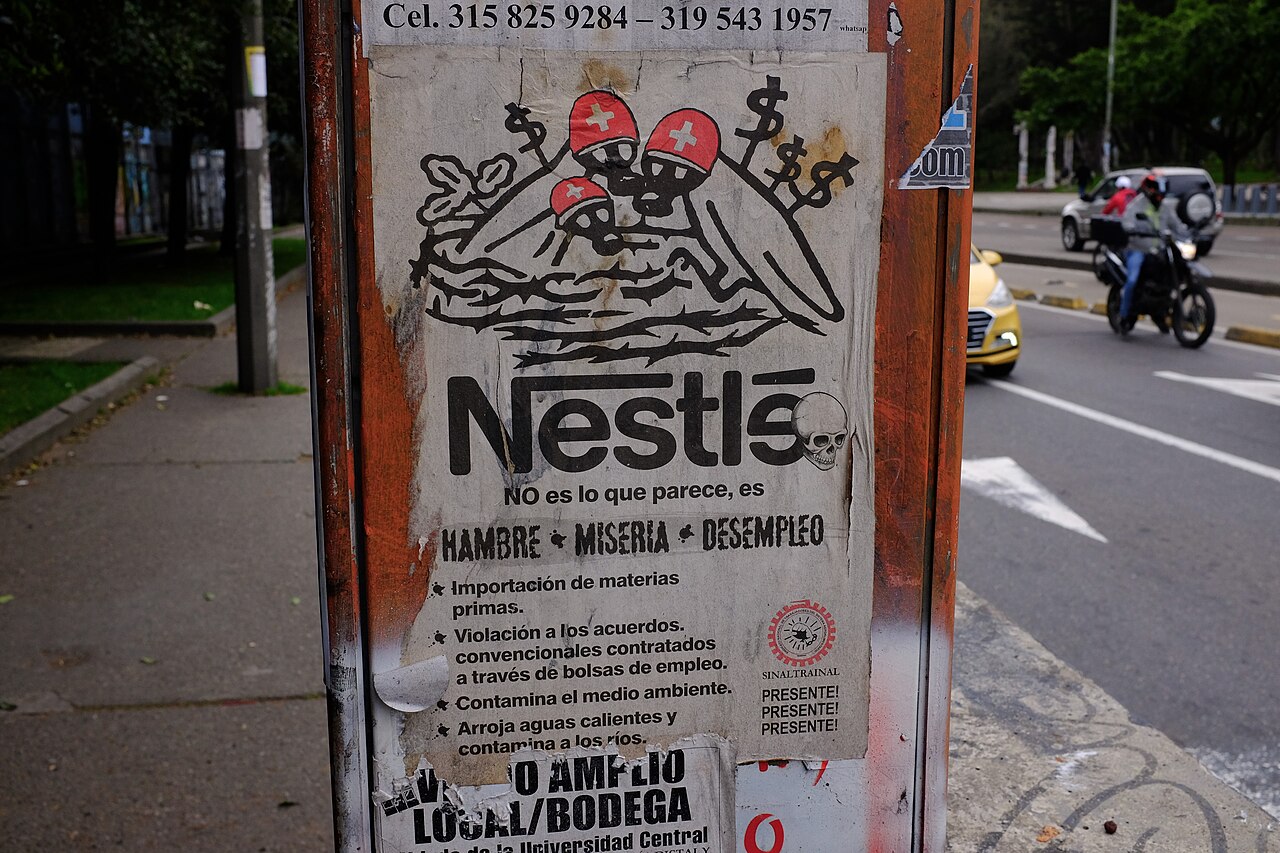Profits over people: The dark legacy of Nestlé
Few corporations have become as synonymous with global consumerism as Nestlé. With over 8,000 brands, ranging from KitKat to Nescafé, and approximately 330,000 people working for it across its 447 factories in 194 countries, the Swiss multinational has a hand in nearly every aisle of the supermarket. They truly are what you would call a giant. Yet, behind its glossy advertising and comforting slogans lies a darker history of child labour, unethical promotion, manipulation, pollution, price fixing, and mislabelling – words no one would want associated with their company. For decades, Nestlé has faced accusations of prioritising profit over human life, raising the question: is it one of the world’s most unethical corporations?
Nestlé infant formula scandal
In the 1970s, Nestlé aggressively expanded its baby formula market, especially in poorer regions of Asia and Africa. Through ads and saleswomen dressed as nurses, the company promoted formula as “the closest thing to mother’s milk,” convincing mothers it was healthier than breastfeeding. Free samples were distributed in carefully measured amounts: just enough for mothers to stop lactating and become dependent on the product.
The results were catastrophic. In areas with poor sanitation, formula was often mixed with unclean water or diluted to save money, leading to malnutrition, disease, and thousands of infant deaths. Breast milk naturally provides antibodies and nutrients that formula lacks, yet Nestlé’s campaigns pushed mothers to abandon it.
The scandal, dubbed the ‘Baby Killer’ controversy, provoked global outrage. The World Health Organisation created the International Code of Marketing of Breast-Milk Substitutes to curb such practices in 1981. Today, the International Nestlé Boycott Committee and student groups worldwide still protest the company. UNICEF estimates that, in unsafe conditions, formula-fed infants are four times more likely to die from pneumonia and up to 25 times more likely to die from diarrhoea compared to breastfed babies. Nestlé, however, has never accepted responsibility for the lives lost, leaving critics to conclude that for the corporation, profits came before children.
Child labour, abuse, and trafficking
During the 2000s the company, along with several others, was accused of using child labour to produce cocoa for its chocolates. Nestlé claimed to have fixed this problem and promised to create ‘ethically correct’ products by the year 2005, but it has clearly done little regarding the issue. As recently as 2021, Nestlé was sued by eight former child slaves for “aiding and abetting the illegal enslavement of thousands of children on cocoa farms in their supply chains”. Nestlé is accused in a class action lawsuit of allowing forced labour on their Ivory Coast cocoa plantations.
Factory waste and pollution
Despite marketing itself as committed to sustainability, Nestlé is regularly named one of the world’s worst plastic polluters. Most of its single-use packaging is unrecyclable, ending up in oceans, rivers, and landfills. While Nestlé has pledged that by 2025 all packaging will be recyclable or reusable, progress has been negligible: reports show only a 1% improvement. Greenpeace has also accused the company of favouring waste incineration over real reduction, which generates toxic emissions harmful to people and wildlife.
Nestlé’s environmental record extends beyond plastic. In 2020, a milk powder plant in France discharged waste into local waterways, killing three metric tons of fish. Globally, the company has been criticised for over-pumping water sources for its Pure Life and Perrier brands — leaving communities in Pakistan, Brazil, and Michigan with reduced access to clean water. During California’s severe 2015 drought, while Starbucks relocated its water operations out of the state, Nestlé’s CEO famously refused to scale back, stating that he would increase extraction if possible.
Health concerns
In July 2009, the FDA and CDC warned consumers against Nestlé Toll House refrigerated cookie dough due to “risk of contamination with E. coli”, an outbreak that sickened over 50 people in 30 states, hospitalised several, and caused one death. Nestlé admitted fault, expressed “grave concern,” and pledged stricter testing of raw materials and finished products.
A year earlier, Nestlé was implicated in the 2008 Chinese Milk Scandal: one of the largest food safety crises in recent history. Melamine, a chemical illegally added to inflate protein content, was found in milk powder products, leading to the deaths of six infants and kidney damage in hundreds of thousands more. Taiwan’s Health Ministry confirmed melamine traces in Nestlé products, forcing recalls. Although Nestlé denied responsibility, it dispatched specialists from Switzerland to strengthen chemical testing at its Chinese plants.
Ethiopian debt
In 2002, Nestlé demanded Ethiopia repay a US$6 million debt dating back to the 1970s – even as the country was suffering a devastating famine. Public backlash was swift, with the company receiving 40,000 protest letters. Eventually, Nestlé backed down, agreeing to a partial settlement of $1.5 million that was reinvested in famine relief. What Nestlé initially defended as a “matter of principle” became a major moral defeat, and a rare example of public opinion forcing a corporate giant to retreat.
While most multinationals have faced scandals, Nestlé’s record stands out for its scale and persistence. From exploiting vulnerable mothers with baby formula to depleting water resources and polluting ecosystems, the company has consistently prioritised profit over people. Boycotts exist, yet Nestlé’s dominance makes it difficult for consumers to truly opt out.
Nestlé’s legacy ultimately underscores the darker side of globalisation. Whether or not it is ‘the most evil corporation’ may be debated, but one truth is undeniable: when profits outweigh accountability, ordinary people and the planet pay the price.

Comments